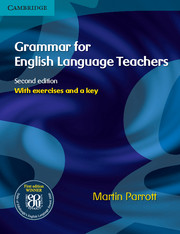19 - Conditional sentences
Published online by Cambridge University Press: 09 February 2023
Summary
Key considerations
Course materials generally present four basic types of conditional sentence. In this chapter we look at each of these types, but within each type we explore a range of possible forms, some of which may be neglected or ignored in popular materials. Finally, we look at some general variants on conditional forms.
Some European languages have special conditional tenses – forms of the verb that are used primarily or only in conditional sentences. This is not true in English, and some people argue that it is misleading to think of conditional structures as being special.
Some learners find it difficult to remember the grammar of long conditional sentences with two clauses. We can help them by teaching and practising one clause at a time, and can provide a lot of opportunities and help for students to ‘get their tongues round’ the complete sentences.
What are conditional sentences?
Course materials usually teach that conditional sentences consist of two clauses – a main (‘conditional’) clause containing a verb in a form with will or would, and a subordinate clause that is introduced by if.
I’ll help you if you want He’d come if you called
What we express in the main clause depends – or is conditional – on what we express in the subordinate (if) clause.
I’ll turn on the heating if it gets colder
We can usually change the order of clause in conditional sentences, e.g. we can say I’ll turn on the heating if it gets colder or If it gets colder, I’ll turn on the heating.
How we punctuate conditional sentences depends partly on their length and partly on personal preference, but in general we separate the two clauses by a comma if we begin with the if clause. We don’t use a comma when we begin with the conditional clause.
In casual conversation if is often barely pronounced. The vowel disappears entirely, and even /f/ is whispered. A phrase like If I were you is pronounced /faɪwəju:/.
- Type
- Chapter
- Information
- Grammar for English Language Teachers , pp. 272 - 288Publisher: Cambridge University PressPrint publication year: 2010



